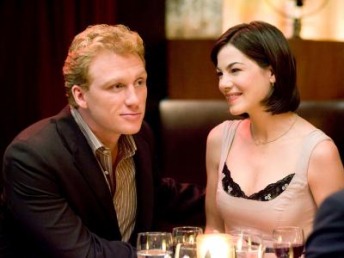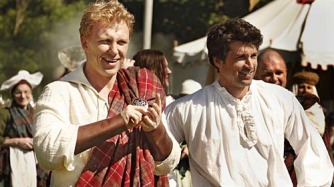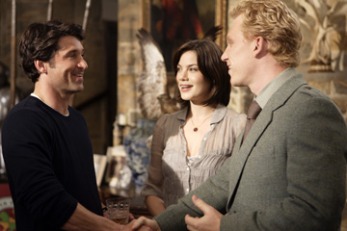- Home
- About Kevin
- News Blog
-
Charity
- Charity Survey
- Online Charity Shop
- Order Speyside Sessions
- About KMKO Charity
- Spread the Word
- Current Events
-
Past Events
>
- Red Nose Day 2016
- Magic of Storytelling Book Drive 2016
- Grey's Anatomy 250th Episdoe Hat 2015
- ThursGrey Auctions 2014
- SCDT Ben Nevis 2014
- Kevin's 40th Birthday Celebration
- From The Heart 2013
- Speyside Sessions 2012
- Tough Giving Challenge 2011
- STC Africa Fast-A-Thon 2011
- Giving Hearts 2011
- Haiti Earthquake Relief 2010
- Out of the Darkness Theatre Company
- Save the Children >
- Tough Mudder >
- Partners for Pediatric Progress >
- News-Press
- Feedback-Comments
-
Archive
- Multimedia
- Fan Zone
- Kevin's Blog
- Contact Us
Made of Honor
"Kevin McKidd: From TV's 'Rome' to 'Made Of Honor.'"

May 16, 2008
Original source: Clickthecity
Giving McDreamy a run for his money – and ladylove – seems like a no-contest, but British actor Kevin McKidd who had his share of fights in HBO’s acclaimed “Rome” series, is not one to back out from a challenge. The actor plays Colin, the Scotsman who comes between best friends Tom (Patrick Dempsey) and Hannah (Michelle Monaghan), in Columbia Pictures’ endearing romantic comedy “Made Of Honor.”
In the film, Tom has finally realized that the woman of his dreams is the one who has been there all along: his best friend, Hannah. But just as he’s getting ready to pop the question, Hannah gets engaged to another man – Scotsman Colin – and throws Tom for a loop by asking him to be her maid of honor. Tom accepts, seeing his opportunity to get close to the bride-to-be and woo her before it’s too late. As Hannah begins to realize that Tom may be marriage material after all, she will have to decide between marrying her best friend or the man who asked first.
Director Paul Weiland says, “I wanted a serious bloke – strong and passionate – to play Colin. It couldn’t be someone that the audience would immediately hate, because he needed to be an equal foe for Tom. Colin is also rich, but he has better manners, he’s more sincere. He seems to be the type of man that Hannah has been waiting for – strong, always there for her no matter what happens. And Kevin perfectly fits the bill.”
McKidd says, “On first impression, Colin is the perfect man. He owns a fantastic castle. He’s the lord of a fantastic plot of land in Scotland. His family has owned a famous distillery of Scottish whiskey for generations and is very distinguished. He’s almost a nobleman – it’s a very posh, old-money family.”
The actor admits that the role represented a break from the types of roles he usually plays. “I was a little nervous at first, because I’ve always done serious, intense films,” he says. “In Made of Honor, I would be working opposite Patrick, a great actor who has been in lots of comedies and lots of romantic movies. He has such a wonderful gift for coming up with stuff on the spot and being funny. I was nervous, but he really made me feel very comfortable.
With these two co-stars, Michelle Monaghan says that falling into her role as Hannah was a piece of cake. “It was very easy to become besotted with these two men. Both Patrick Dempsey and Kevin McKidd are extremely, extremely charming. How bad could that be for an actress to play against?”
A serendipitous moment came when the filmmakers discovered that McKidd had a wonderful, though untrained, singing voice. In a scene originally scripted to have Colin, during a grand dinner party at the family castle recite a Robert Burns poem to his bride to be, McKidd instead sang a traditional Scottish song, “Love is Like a Rose,” to nary a dry eye in the house – both cast and crew!
“Colin just really wows Hannah,” Monaghan notes. “She’s been waiting for her Prince Charming, and she thinks she’s found him in Colin. He’s new and fresh and unexpected and lovely. I swear, when Kevin sang ‘Love is Like a Rose,’ he melted my heart during each take. He is just so loving – and that accent! Cupid has caught her right between these two men.”
"Kevin McKidd in Made of Honor."

May 2008
By Robert Abele
FOR MANY actors, the thrill of the calling lies in the ornamental and internal details that transform who they are into what they're not. And good-natured Scottish actor Kevin McKidd has made a name for himself playing such varied roles as a doomed drug addict ("Trainspotting"), a brooding Caesar-era soldier (HBO's "Rome") and a time-traveling journalist (last year's NBC drama "Journeyman").
But to play Scots-born Colin McMurray in the romantic comedy "Made of Honor" -- who by planning to marry Michelle Monaghan's art historian character becomes an unwitting rival to her best friend, Patrick Dempsey's torch-bearing rake -- McKidd received a bit of direction from Paul Weiland that threw him.
"He just wanted me to be me," says McKidd in a phone interview, his basso brogue still a little incredulous in recalling the challenge. "And, initially, I found that really hard. I generally do not play myself, you know? I felt very naked and sort of exposed almost."
Unlike most romantic foils assigned the storytelling task of keeping lovers apart -- easily identifiable as ill-matched because of some notable flaw -- McKidd's Colin is the perfect man: gentlemanly, not jealous, landed-gentry rich (the family owns a distillery) and devoted. He even innocently discovers he can dunk a basketball, to the consternation of Dempsey's athletically competitive character.
"When you're so used to looking for the kind of Chekhovian darkness beneath everything that's said, to be told, 'I don't want you to look for subtext,' to just literally say the words and be in the moment and be genuine, is the toughest thing," he says. "But by the end of it, I grew to really enjoy it, and found it quite liberating."
Oddly enough, Colin's clichéd Tartan trappings were what was most unlike McKidd, 34, who hails from more working-class Scottish roots in Elgin.
"It's poking fun at that very upper-class shortbread-tin, kilt-wearing bracket of Scottish society -- people who live in castles and hunt for wild animals," says McKidd, who was thrilled to go from the geographical novice during the L.A. portion of the shoot to the on-set expert when filming moved to his homeland. "It was a real joy. I got to show people Scotland. And we had freakishly beautiful weather."
But when he first read the script, the patriotic countryman in him took minor offense at the haggis jabs and whatnot. He even made his parents read it as a way to gauge whether he should take the part. "They laughed their asses off," he says. "They saw the funny side of it."
Now he can even point to jokes like when one of Colin's family members speaks an incomprehensible tongue. Admits McKidd: "I go to certain towns in Scotland, and I can't work out what anybody's saying."
April 27, 2008
By: Alistair McKay
Source: Scotsman.com
(movie review)
"Never Mind the Bannocks"
AS TOMMY in Trainspotting, it was Kevin McKidd who tried to introduce his friends to the splendour of the countryside. His innocent inquiry, "Doesn't it make you proud to be Scottish?", prompted Ewan McGregor's Renton into one of the film's most famous outbursts, too splenetic to be quoted here, the gist being that we Scots were the lowest of the low, the scum of the Earth, the most wretched, servile, miserable, pathetic trash that was ever delivered into civilisation. "Some people hate the English, but I don't," Renton continued. "They're just bankers. We, on the other hand, are colonised by bankers. We can't even pick a decent culture to be colonised by." But he didn't say "bankers". That would have been too prescient.
Much has happened in the 11 years since Trainspotting was released. The second part of Renton's manifesto – with a few tonal modifications – has become the guiding policy of the SNP administration, the popularity of which is based on the implication that non-believers are in favour of the first part: the wretched, miserable, pathetic servility.
Kevin McKidd has moved on too. He is now an American TV star, and here he plays the love rival to Patrick Dempsey in a romantic comedy directed by Paul Weiland, whose CV includes City Slickers II: The Legend Of Curly's Gold and the Walkers crisps commercials.
McKidd is Colin, a Scott's Porage Oats Scotsman. His family owns the country's largest whisky distillery, and his idea of romance is to send a transatlantic gift of something called a Scottish bud thistle, which only blooms for four hours before it dies. He is an aristocrat – a duke, no less – with a family seat somewhere on Skye (the film uses a mix of castles, including Eilean Donan and Dunvegan).
The Scotland he inhabits is quite fantastic, but not in a good way. It makes Brigadoon look like one of Ken Loach's cheese dreams, and the effect is made no less painful by the idiot parade of decent Scottish actors – veterans of 7:84, Wildcat, Take The High Road and Rab C Nesbitt – gooning as if their ration of bannocks depended on it. As Dempsey's character, Tom, notes on discovering that his sophisticated friend Hannah (Michelle Monaghan) has fallen for one of these tartan-clad primitives: "I think she thought she was in some bad werewolf movie: 'Stay off the moors, lassie.'"
The story begins in 1998, at the time of the Clinton-Lewinsky scandal. Dempsey is a self-assured (obnoxious) student in a Bill mask, making an amorous call on his girlfriend during a party. He clambers into bed, but instead of snuggling up to his fancy-dress Monica, he startles her roommate, Hannah, who mistakes him for a rapist and sprays a noxious liquid in his eyes. "What was that, Mace?" Tom asks. "Eternity by Calvin Klein," Hannah replies. On such repartee are great friendships made.
Ten years later, Tom is rich, having invented the "coffee collar" – the paper insulation which goes around a Starbucks takeaway – and good-looking in the manner of a grain-fed Richard Gere. By normal standards he is a pillock, but in the grammar of romantic comedy can be mistaken for a charming man who Just Can't Commit. He drives an Aston-Martin, and doesn't tuck his shirt in. He dates – sleeps with – lots of women, but never the same one on consecutive nights. He and Hannah are best friends, but Tom is mysteriously blind to the fact that she is The One, even if she has been his official partner at all six weddings of his father (Sydney Pollack).
Long story short: Hannah gets posted to Scotland, Tom misses her, and decides he is, after all, the marrying kind. But when Hannah returns from Caledonia, her troth is pledged to hunky Colin.
What to do? This being visual chicklit, honesty isn't an option, so Tom agrees to be Hannah's Maid of Honour in the hope that he will be able to persuade the bride-to-be that he would make a more suitable husband than the dashing teuchter. This battle concludes with a showdown at the McMurray family highland games in which, according to Scottish custom, the victor gets the bride. The two men are battling to prove which is the bigger tosser (cabers are optional).
True romantics will not be surprised by the outcome. There is a bit of Burns, a wise sheepdog, and a scene which impugns the reputation of Scottish hairdressers. Myra McFadyen gets to play an impenetrable bauchle with a speech impediment and a faultless grasp of her family tree. "We're a long line of Atholls," she lisps, hilariously.
April 24, 2008
By: Paul Byrnes
Source: Sydney Morning Herald
(movie review)
There are bylaws in New York about how much filling goes into a pastrami on rye sandwich. Same with romantic comedy. Somewhere at City Hall, I think there must also be an old guy with an eyeshade and half a cigar who checks that all rom-coms comply with the regulations. Has it got two cute and shiny (usually white) people aged about 30? Check. Are they in love but don't know it? Check. Are they rich, or at least not poor? Check. Does it end with a wedding? Check. OK, here's your permit.
Think I'm kidding? Name one romantic comedy set within a black or Hispanic community; name another where the characters are struggling to put food on the table. This type does have a few contenders, although I'm not sure Holly Golightly was actually poor in Breakfast at Tiffany's - more like underfunded. There are a lot where the woman is poor, but she trades up to Prince Charming - Jennifer Lopez has done some like this, mostly badly.
The reason for the sameness is that rom-coms are a branch of advertising, rather than cinema. They reassure the target audience - women and teen girls - that they can have it all: the beautiful, sensitive, hunky man (often played by an actor with a Celtic surname, such as McConaughey, Mulroney or Butler), the great job (marketing or media, preferably book or magazine publishing, especially a fashion mag), the great apartment, with roomy terrace, and lots of eternal love. Happy ever after, Cinderella marries Matthew or Dermot or Gerard and the credits roll over kisses and confetti.
The challenge, within these constraints, is to do something new and with flair - as P.J. Hogan did with My Best Friend's Wedding (which changed the city to Chicago), or Dudley Moore and Liza Minnelli did in Arthur.
In the first, people kept breaking into song; in the second, Arthur kept breaking into drunken giggles, with John Gielgud as his straight man. In both films, the characters weren't children, and that helps. A certain age and still not married usually means the bloke's half-grown; that's useful for characterisation. He's afraid to commit, emotionally stunted, a playboy or a pisshead. A whiff of reform in the female character also seems to be popular - as in, "I could fix him, if only he'd let me."
Made of Honour has most of these, plus the one thing I haven't mentioned - the comic hook, in which one of the two ends up in a role they're not expecting. They could be a man in a woman's body, or vice versa. In this one, Patrick Dempsey becomes Michelle Monaghan's maid of honour (it's a double Celtic combination with those names).
He's Tom, an extremely eligible New York bachelor who prefers a new girl each week, none of whom gets to stay at his gorgeous apartment in what looks like the Dakota building.
She's Hannah, an art restorer who's been his best friend since college, when he tried to pick her up. Tom is now a millionaire, having invented the coffee sleeve, that little cardboard thingy Americans put around what they call coffee to stop their fingers getting burned. Hannah is the one girl he talks to, and the only one he takes to his father's frequent weddings. Dad, played by Sydney Pollack, is where Tom will end up if he can't face up to love. Dad can't remember which wife he's on, six or seven.
Dempsey and Monaghan are immensely attractive. At 42, he's older than the usual male lead in these movies, but he looks about 35 and he's been hard at work on his romantic image in pictures like Enchanted. Monaghan's career has taken off since Mission: Impossible III and she's cute as a bug in this one, twinkling and smiling all the way to Scotland, where she meets Colin McMurray (Kevin McKidd), a dashing laird who rides a horse, owns several castles and a distillery (the perfect man, of course).
She returns to New York with her new fiance just as Tom works out he really loves her. It's My Best Friend's Wedding in a kilt, with a twist - she asks Tom, her best friend, to be her maid of honour.
There are a great number of improbabilities here but this genre is driven by improbability; it helps to create the sense of a fairytale. The pay-off is in comedy and Made of Honour has its moments. The English director Paul Weiland has travelled through 20 years of English TV comedy, including episodes of Mr Bean and Blackadder. He has plenty of experience with physical comedy, and that's the most successful element here. The least is the series of smutty sight gags, which are half-hearted and out of place. It's as if he's taking the mickey - and that's not on.
Exaggerating the genre cliches is a joke the audience can share; deriding their belief in romance, the genre's sacred trust, is not.
|
TEAM McKIDD : ADMIN
This official site (KMKO) is affiliated with and endorsed by Kevin McKidd but it is not run by Kevin, his family, or management. Team McKidd operates the site and, in cooperation with Kevin, organizes charity events, Q&A chats, autograph requests, contests, giveaways, etc. Team McKidd members volunteer their time, and donate other resources, to manage the site and KMKO social media daily. Fan mail and autograph information can be found on the Contact Us page. See this list of Official Kevin McKidd Links. |
Copyright 2023
Best Viewed In Firefox Disclaimer & Privacy Policy |

